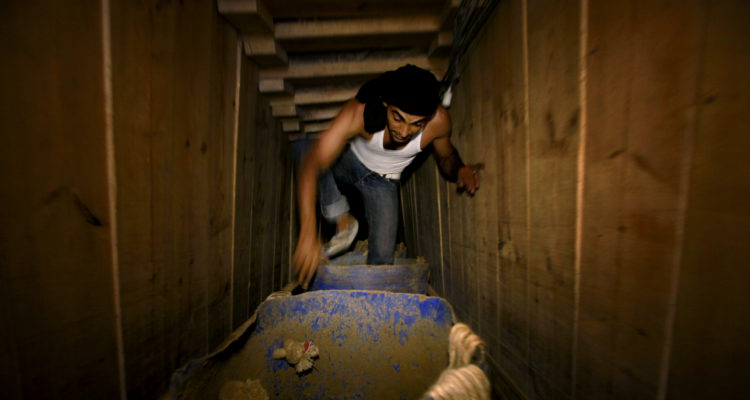IDF reportedly considering flooding Hamas’ vast tunnel network.
By Batya Jerenberg, World Israel News
One of the options the IDF is considering in order to strike a decisive blow against Hamas is to flood its vast tunnel networks with sea water, columnist David Ignatius wrote in The Washington Post Sunday after interviewing numerous military sources.
The Gaza Strip, the veteran journalist pointed out, is conveniently located on the Mediterranean Sea. The IDF must be thinking, he wrote, if there’s a real need to risk soldiers’ lives by sending them into narrow and booby-trapped corridors.
“Water is a powerful force of nature — even more so when it is amplified by pumps. One thing about tunnels is that they’re vulnerable to flooding, even if they have elaborate drainage,” as Ignatius wrote.
He made clear that no Israeli officials told him anything about possible plans, but that Defense Minister Yoav Gallant had made the “cryptic” comment that “You need an industrial solution.”
Bombing hundreds of miles of underground passages may not be a particularly efficient method of killing terrorists, Ignatius noted.
Previous experience backs him up. When the IAF destroyed miles of the so-called Gaza City “metro” in a massive single attack during 2021’s Operation Guardian of the Walls, the pilots dropped some 450 missiles on 150 targets but the number of enemy combatants who died was in the dozens.
The hope had been that Hamas fighters would fall for a rumor of an Israeli ground incursion, and so flee en masse into the tunnels for protection. Of course, today the IDF is fully engaged on the ground in the Strip, and the tunnels really are the safest place for the combatants to be, especially as many are highly fortified.
Still, aerial bombardment is also likely to cause many civilian deaths, another point the journalist made.
This truth can also not be denied, especially considering that Hamas deliberately situated its military tunnels beneath private homes, mosques, schools and hospitals that can collapse – as many houses did in 2021 – when the tunnels explode from all the munitions stored inside them.
Israel is already being accused of “genocide” as Hamas has claimed, albeit without showing evidence, that over 12,000 civilians have been killed by Israeli forces, mostly in airstrikes. Ignatius wrote that the Jewish state doesn’t need more image problems than it already has as the world is flooded with scenes of Gazan suffering.
This also increases international pressure for a ceasefire, which would leave Hamas still intact – something that no one in Israel will accept.
Ignatius wrote that now that Israel controls the northern part of Gaza, the next natural step to eradicating Hamas is to move south. But this part of the Strip is more crowded than ever, because the IDF told the Gazans to flee there from the north so it could minimize civilian casualties during its first stage of ground fighting – although many in the world did not accept this as a humanitarian move.
Israel knows it must continually show the global community that it cares about minimizing collateral damage in its fight against terrorism, in order not to lose “the information war,” Ignatius wrote. His military sources told him that plans are being made to build a huge tent city for refugees on the coast, just above the Egyptian border. This would ease the way to deliver humanitarian aid by both sea and land, through the Rafah crossing.
“After the intense international criticism for the hospital battles in northern Gaza, Israeli commanders want to quickly create temporary medical facilities for thousands of wounded civilians threatened now with starvation and infectious disease,” he added.
Prime Minister Benjamin Netanyahu already used the “danger of epidemics” to both Gazans and Israeli soldiers, to explain why the war cabinet unanimously decided at the end of last week to allow fuel into Gaza to enable the operation of its sewage and water plants.
The decision was opposed by right-wing coalition members, who said that one doesn’t supply an enemy in wartime, and Hamas could simply grab it for themselves. As Netanyahu himself has pointed out, Hamas needs fuel for its rocket launchers and tunnels’ air filtration systems, among other military uses.




